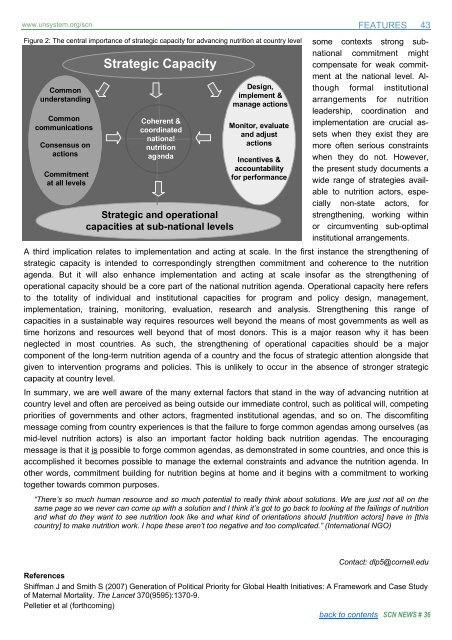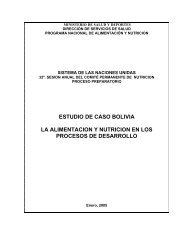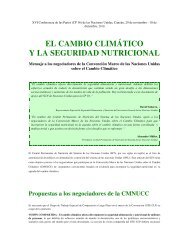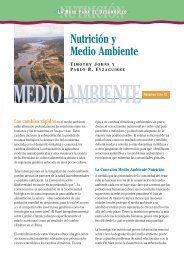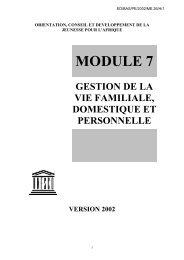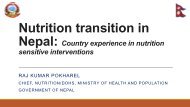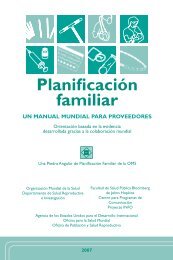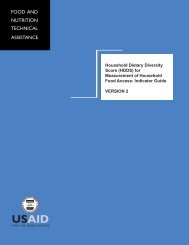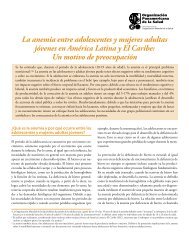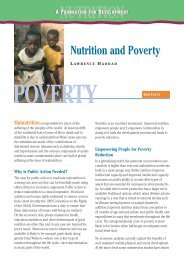SCN News No 36 - UNSCN
SCN News No 36 - UNSCN
SCN News No 36 - UNSCN
You also want an ePaper? Increase the reach of your titles
YUMPU automatically turns print PDFs into web optimized ePapers that Google loves.
www.unsystem.org/scn FEATURES 43<br />
Figure 2: The central importance of strategic capacity for advancing nutrition at country level<br />
Common<br />
understanding<br />
Common<br />
communications<br />
Consensus on<br />
actions<br />
Commitment<br />
at all levels<br />
Strategic Capacity<br />
Coherent &<br />
coordinated<br />
national<br />
nutrition<br />
agenda<br />
Strategic and operational<br />
capacities at sub-national levels<br />
Design,<br />
implement &<br />
manage actions<br />
Monitor, evaluate<br />
and adjust<br />
actions<br />
Incentives &<br />
accountability<br />
for performance<br />
some contexts strong subnational<br />
commitment might<br />
compensate for weak commitment<br />
at the national level. Although<br />
formal institutional<br />
arrangements for nutrition<br />
leadership, coordination and<br />
implementation are crucial assets<br />
when they exist they are<br />
more often serious constraints<br />
when they do not. However,<br />
the present study documents a<br />
wide range of strategies available<br />
to nutrition actors, especially<br />
non-state actors, for<br />
strengthening, working within<br />
or circumventing sub-optimal<br />
institutional arrangements.<br />
A third implication relates to implementation and acting at scale. In the first instance the strengthening of<br />
strategic capacity is intended to correspondingly strengthen commitment and coherence to the nutrition<br />
agenda. But it will also enhance implementation and acting at scale insofar as the strengthening of<br />
operational capacity should be a core part of the national nutrition agenda. Operational capacity here refers<br />
to the totality of individual and institutional capacities for program and policy design, management,<br />
implementation, training, monitoring, evaluation, research and analysis. Strengthening this range of<br />
capacities in a sustainable way requires resources well beyond the means of most governments as well as<br />
time horizons and resources well beyond that of most donors. This is a major reason why it has been<br />
neglected in most countries. As such, the strengthening of operational capacities should be a major<br />
component of the long-term nutrition agenda of a country and the focus of strategic attention alongside that<br />
given to intervention programs and policies. This is unlikely to occur in the absence of stronger strategic<br />
capacity at country level.<br />
In summary, we are well aware of the many external factors that stand in the way of advancing nutrition at<br />
country level and often are perceived as being outside our immediate control, such as political will, competing<br />
priorities of governments and other actors, fragmented institutional agendas, and so on. The discomfiting<br />
message coming from country experiences is that the failure to forge common agendas among ourselves (as<br />
mid-level nutrition actors) is also an important factor holding back nutrition agendas. The encouraging<br />
message is that it is possible to forge common agendas, as demonstrated in some countries, and once this is<br />
accomplished it becomes possible to manage the external constraints and advance the nutrition agenda. In<br />
other words, commitment building for nutrition begins at home and it begins with a commitment to working<br />
together towards common purposes.<br />
“There’s so much human resource and so much potential to really think about solutions. We are just not all on the<br />
same page so we never can come up with a solution and I think it’s got to go back to looking at the failings of nutrition<br />
and what do they want to see nutrition look like and what kind of orientations should [nutrition actors] have in [this<br />
country] to make nutrition work. I hope these aren’t too negative and too complicated.” (International NGO)<br />
Contact: dlp5@cornell.edu<br />
References<br />
Shiffman J and Smith S (2007) Generation of Political Priority for Global Health Initiatives: A Framework and Case Study<br />
of Maternal Mortality. The Lancet 370(9595):1370-9.<br />
Pelletier et al (forthcoming)<br />
back to contents <strong>SCN</strong> NEWS # <strong>36</strong>


